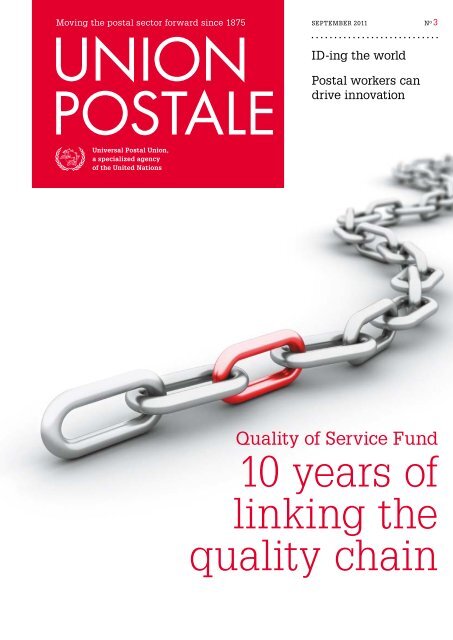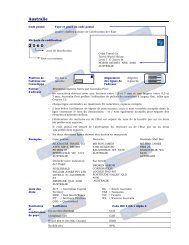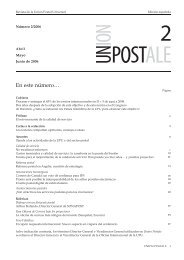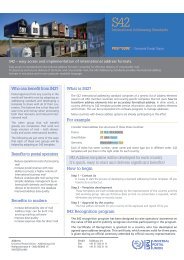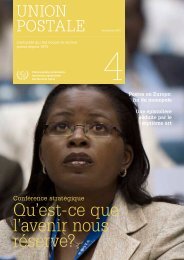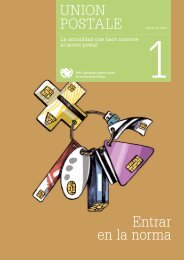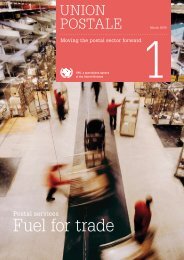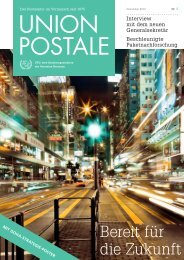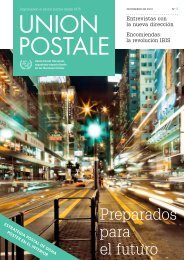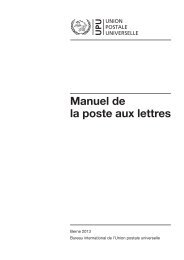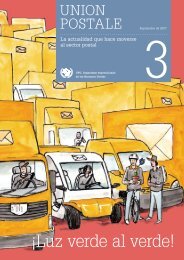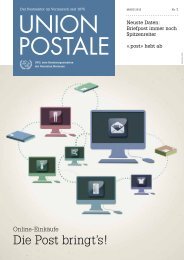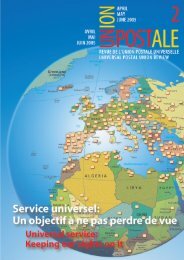English pdf - UPU - Universal Postal Union
English pdf - UPU - Universal Postal Union
English pdf - UPU - Universal Postal Union
- No tags were found...
Create successful ePaper yourself
Turn your PDF publications into a flip-book with our unique Google optimized e-Paper software.
in brief<strong>Postal</strong> securityInter-committee work moves forwardNapolitano recently voiced support for <strong>UPU</strong>-led work (Photo: DHS)The new <strong>UPU</strong> inter-committee securitygroup (ICSG) says work is progressingwell in gathering data to createa new security model for the safetransportation of mail by air.The group, which recently metfor a second time at <strong>UPU</strong> headquartersin Berne, aims to harmonizeglobal postal security standards toensure that international mail canmove smoothly in a world where airsecurity is constantly heightened.Set up in April, the group gatherspostal representatives from all overthe world, as well as aviation, customs,standards, trade and securityorganizations, including the UnitedStates’ Transportation Security Agency(TSA).Chairman Ebbe Andersen fromPost Denmark says the group’s workplan is on schedule. “Our challengeis to better understand how internationalmail operations work in differentcountries,” said Andersen.“How is international mail inductedin the network? How is it transported?What security measures areapplied? We are looking for the gapsto find a common solution, as anynew security measures will have animpact on all postal operators.”The group will present a draftframework to the <strong>UPU</strong> Council ofAdministration and <strong>Postal</strong> OperationsCouncil before seeking formaladoption at the <strong>UPU</strong> Congress in2012.Once a model is developed, thegroup wants to test it through a pilotproject, Andersen explained. “A pilotwith the airlines will be key to see ifit works.”Harmonization criticalThe <strong>UPU</strong> believes a postal securitymodel dealing with the specificitiesof international mail sent on commercialand cargo airlines is needed.This would avoid security measuresbeing developed and imposed by individualcountries or administrations,which wreak havoc on internationalmail transportation.New security rules introducedlast year by the TSA led many Poststo stop or delay sending US-boundmail for several months. The <strong>UPU</strong>wants to avoid similar situations in future,knowing that other countriesand the European <strong>Union</strong> are workingon their own air transportation securitymeasures.State supportJanet Napolitano, head of the US Departmentof Homeland Security(DHS), praised the <strong>UPU</strong>’s efforts increating international standards insecurity. Speaking at a June meetingof the World Customs Organization(WCO), Napolitano recognized recentjoint efforts by the <strong>UPU</strong>, WCOand International Civil Aviation Organization(ICAO) to strengthen theglobal mail supply chain.“We should all support the workunderway within the <strong>UPU</strong>… to developa global standard for advancedata on mail shipments for securitypurposes, as well as standard processesfor handling and resolvinganomalies detected at internationaltransit hubs. The goal of these effortswill be to update the <strong>UPU</strong> Conventionand underlying Regulations, aneffort we all hope can be accomplishednext year,” Napolitano said.The DHS is working with the<strong>UPU</strong>’s ICSG. As well as <strong>UPU</strong> membercountries, members include theWCO, ICAO and the World Trade Organization.“This group has made impressiveprogress over the last several monthsin establishing emergency securitycontacts in all 191 <strong>UPU</strong> memberstates to respond to mail transitalarms. I encourage those countries...not yet participating to support thiseffort,” Napolitano said.She also emphasized the importanceof not impeding internationaltrade. “The global supply chain systemmust be able to continue to function,and quickly recover from majordisruptions, because the efficientfunctioning of the global logisticssystem is essential to the globaleconomy.” RL & FM4 · <strong>Union</strong> <strong>Postal</strong>e 3/2011
Editor’s noteIn the communication and journalism business, theproverb, “empty vessels sound the loudest”, rings true.When forging communication strategies, deciding whatand how to communicate with our diverse stakeholders,listening carefully to the many voices is a requisite forthe job. It enables the wheat to be carefully separatedfrom the chaff, a crucial task when the credibility of anorganization or company is at stake.So, one of the pleasures of my current job is discoveringthe unsung heroes of the postal sector. Communicatingabout their achievements and telling theirstories make the postal business come alive and showthat our industry is a relevant one with a human touch.These heroes come from all walks of life but, as professionals,they share a high degree of competence andexpertise, devoting their energies to worthwhile projectsand letting the results speak for themselves.The unsung heroes featured in the last issue werefrom Japan Post. This time, the spotlight is on theQuality of Service Fund (QSF), celebrating its 10 th anniversarythis year.The QSF’s work reflect values at the <strong>UPU</strong>’s core:partnering with designated operators to effect real andlasting changes to quality of service levels on theground. To borrow the words of Rhéal LeBlanc, the<strong>UPU</strong>’s Communication Programme manager, and coverstoryauthor: “The simplest ideas are sometimes thebest. And the idea of setting up a fund to improve universalservice quality has proven to be a case in point.”This is a success story built on the many labours ofits secretariat, the QSF coordinators out in the field, theboard trustees, Posts and member countries. The figuresmentioned in the cover story leave us in no doubtabout the magnitude and importance of this collaborativework.Other magazine highlights include a look at identificationservices offered by Posts and an interview withthe head of Uni Global <strong>Union</strong> on letting postal workersenter the debate on business innovation.Faryal Mirza, Editor-in-chief, <strong>Union</strong> <strong>Postal</strong>e magazineWorld postal strategyRegional roundtables updateThe financing of the universal service,human resources and financial serviceshave dominated the regionalroundtables held to date. The discussions,held in seven locationsacross the globe, were designed toenable regional players to voice theirconcerns and requirements for thefuture global postal roadmap.Six rounds of regional discussionsallowed 400 participants from morethan 170 member countries to discussthe proposed objectives of thenext world postal strategy.In Addis Ababa, Ethiopia, theuniversal service, its implementationand funding in Africa, was discussed.Cameroon raised the point that theadaptation of the universal service tomarket conditions could be part ofthe new strategy. Nigeria also saidthat capacity-builidng and trainingacitivities were required to ensurestrategy implementation at the regionallevel.In St Petersburg, Russia, talks focusedon developing financial services.This covered increasing investmentin information and communicationtechnologies and improvingaccess to postal financial services.Financing the serviceAt the discussions in Ulaanbaatar,Mongolia, China said it consideredsector reform and development aspriorities for the next world postalstrategy. Indonesia mentioned theimportance of new technologies todrive sector reform. The financing ofthe universal service was also mentioned,with countries calling on the<strong>UPU</strong> to play a more pro-active role.Speaking in Doha, Qatar, in September,<strong>UPU</strong> Director GeneralEdouard Dayan said there were anumber of important areas to consider.These included: a clear strategyfor the <strong>UPU</strong>, work programmes andprojects, which were not only concretebut also implementable, andhuman resources and financing. FM3/2011 <strong>Union</strong> <strong>Postal</strong>e · 5
in briefWho’s who at the <strong>UPU</strong>A passion for printName: Jean-Luc VoisardPosition: Print-shop headNationality: SwissIf you are reading this magazine inGerman, Spanish, Arabic, Russian orChinese, it was printed by Jean-LucVoisard and his team. Voisard headsthe print shop on the first floor of theInternational Bureau (IB). He and hisfour colleagues are responsible forprinting the hundreds of agendas,circular letters, regulations and publicationsthat keep the <strong>UPU</strong>’s membercountries informed.“We print all the conference documentstoo,” he says, gesturing to awall of binders stuffed with papers inthe United Nations’ six languages.The print shop also producesCDs, DVDs, envelopes, barcode labelsand occasionally publications inbook-style. Voisard’s team also looksafter the 28 office printers scatteredthroughout the IB.Voisard oversees the busy shopfloor from a glassed-in office that hiscolleagues affectionately call theaquarium. Its several tables are piledhigh with printing equipment andfinished documents.“As head, I organize the productionwork. I can handle all the machinestoo, doing small repairs, knowthe software, and work on the floor,when someone is absent,” Voisardsaid.He admits to a long-held passionfor his profession. “I was always interestedin anything to do withgraphics, everything about books,the printed word, the laying out ofwords on a page,” he said. With afour-year training course as a printspecialist behind him, followed byyears of experience, Voisard heardthere was an opening at the IB in1997. His application was successful.Outside work, Voisard spendstime with his four children and workson his languages. He is fluent inFrench and Spanish and wants to improvehis <strong>English</strong>. “I am doing acourse; it’s hard but I’m trying,” hesays.Voisard is also an avid hockeyand football fan and a midfielder onthe IB football team. RPWorld Post Day onFacebookThe <strong>UPU</strong> will use World Post Day on 9 October as the launchtheme for its new Facebook page. To drum up interest beforethe big day, check it out now, become a friend and inviteothers to join too.Facebook and other social media tools offer the <strong>UPU</strong> anopportunity to increase its communication efforts, reachingnew audiences and keeping people everywhere informedabout our work and projects, postal issues in general.The theme of this year’s annual World Post Day messagefrom the <strong>UPU</strong> Director General is: “The Post, an invaluablepublic service worldwide”. Watch it on the <strong>UPU</strong>’s YouTubechannel or on the new Facebook page. RLLithium batteriesAir transport not on the listIn the last issue of <strong>Union</strong> <strong>Postal</strong>e (June 2011), readers wereinformed that new provisions on the transport of itemscontaining lithium batteries would come into force onOctober 1, 2011.A new development, however, means that the provisionscoming into force on that date will apply to all modes oftransport, except air. Further discussions on aligning theInternational Civil Aviation Authority’s own provisionswith the changes made to the <strong>UPU</strong>’s Convention will takeplace in October 2011.For further information, please contact: David Bowers,david.bowers@upu.int, +41 31 350 31 11. FMwww.facebook.com/ universalpostalunionwww.youtube.com/universalpostalunion6 · <strong>Union</strong> <strong>Postal</strong>e 3/2011
Cover storyQuality of Service Fundclocks up 10 yearsSince its launch on April 23, 2001, the <strong>UPU</strong>’sQuality of Service Fund (QSF) has invested more than98 million USD in 600 projects across the globe toimprove service levels in letter post.3/2011 <strong>Union</strong> <strong>Postal</strong>e · 7
ByRhéal LeBlancBurundi is a small country, covering some 28,000 km 2 .The Post employs over 600 people and operates 53 postoffices and a single sorting centre. Back in 2008, it wasstruggling to deliver 70 per cent of letters addressed toinhabitants of Bujumbura, the capital, within one workingday of posting or J+1 as it is known within the postalindustry. Elsewhere in the country, 65 per cent of letterswere delivered by J+2: a respectable result but postalmanagers knew they could do better.To transport mail to and from the airport, the Posthad only a single open-top 4x4 truck. It was not unusualfor mail dispatches, exposed to the elements, to beblown away by a gust of wind or soaked by rain. Somethingneeded to be done.A simple but effective QSF project, involving the purchaseof two vehicles, which protect mail from theelements, changed everything. One of the two new trucksenabled the Post to make more frequent runs between theexchange office and the airport, based on flight times anda revised mail forwarding plan, while the other wasassigned to mail deliveries in the country’s north.Lasting resultsToday, not only are mail dispatches travelling to andfrom the airport in secure and weatherproof conditions,but delivery times have also improved significantlythanks to faster forwarding of incoming mail to thesorting centre. Some 90 per cent of mail is now deliveredin J+1 in Bujumbura, beating the target of 80 per cent.In the rest of the country, 80 per cent of mail is deliveredby J+2, compared with an initial target of 75 per cent.Lazare Ndabubaha, QSF coordinator at the BurundiPost, is delighted with the results. And he talks excitedlyabout a new project, due to be presented to the QSFtrustees for approval, to consolidate the current performancelevel in Bujumbura and increase J+2 deliveryto 85 per cent elsewhere in the country. “If the projectis approved, we will replace one vehicle and buy ninenew motorcycles to carry mail... right into villages thatcan only be reached by dirt tracks,” Ndabubaha said.8 · <strong>Union</strong> <strong>Postal</strong>e 3/2011There are many such QSF stories. From Benin toZambia, a multitude of projects have improved letterpostservice quality, especially in terms of improvingtransmission and delivery times, adopting new technologiesto better manage mail volumes, purchasing newequipment or improving mail security. As befits its roleof improving universal service, the QSF is fundedthrough an increase in the terminal dues paid to countriesto compensate them for the delivery of incominginternational mail; with five billion items on the moveeach year, the sums involved are not insignificant.Humble beginningsSince its creation, the QSF has proven to be a stablesource of funding: a one-of-a-kind postal developmentfunding mechanism directly linked to the <strong>UPU</strong>’s mission.Its funds are similar to credits put at the disposal ofbene ficiary countries, to be paid out if a project proposalis approved by the QSF board of trustees.At the end of 2010, the amount available for newprojects stood at 46 million USD. Eleven countries eachhad funds or credits totalling more than one millionUSD, while 10 had between 500,000 and one millionUSD. Sixty-four had funds of 100,000–500,000 USDand 92 had under 100,000 USD.In the first year of the QSF’s existence, fewer than10 projects were submitted. Ten years on, its board oftrustees, which is responsible for examining, approvingand monitoring the progress of all projects, typicallygives the green light to over 50 initiatives each year. Itapproved 57 new projects in 2010. These included aproject in Mexico, costing an estimated 1.3 million USD,which will enable the Post to improve its postal operationsthrough the building of an automated sortingcentre. In Côte d’Ivoire, where the Post suffered as aresult of the recent civil war, a project totalling123,000 USD will lead to improvements in mail deliveriesin Abidjan, the economic capital, and in four othermajor cities. Suriname is developing an addressing andpostcode system, while the Bulgarian Post, thanks to
Nearly 400,000 USD from the QSF bought 260 handheld personal digitalassistants for Lebanon Post’s letter carriers. Staff now use them to optimizedelivery of registered items to meet international standards.(Photo: Liban Post)A multimillion dollar project helped China Post developsophisticated tools to translate addresses in non-Chinesecharacters on incoming international mail into Chineseones to enable better processing. (Photo: China Post)two projects totalling over a million USD, will improvethe reliability and accessibility of postal services alongwith mail processing in airport processing centres andinternational exchange offices.Lasting qualityDenise Vreuls has been QSF project manager since2004. Vreuls, who will retire in November 2011, hasseen the QSF go from strength to strength. Her team atthe <strong>UPU</strong> headquarters has grown from two to eightpeople and she oversaw the inception of regional fundingprojects in 2004 and global projects in 2008 andthe introduction of field evaluation of projects in 2004.Also on this list was the adoption at the 2008 <strong>UPU</strong>Congress of new operating rules for the QSF, providingboth fairer distribution and more significant financialresources to the countries that needed them most, particularlythe least developed countries.While the QSF can be proud of the hundreds of projectsthat it has inspired countries to submit over the3/2011 <strong>Union</strong> <strong>Postal</strong>e · 9
“The goal of a project is not just tobuy vehicles or install a new softwaretool. These actions are justmeans to an end: it’s all aboutachieving lasting postal servicequality in the country.”QSF facts– Between 2001 and December 2010, theQSF funded almost 600 projects throughoutthe world, totalling 98,334,000 USD.– The first country to benefit from the QSFwas Benin in April 2001, with a project toimprove access to postal services in outlyingareas of the economic capital, Cotonou.– Chile and Argentina are the countries thathave submitted the largest number of QSFprojects over the years (19 and 16 respectively).– There have been 18 regional projects andeight global projects benefiting groups ofcountries.– At December 31, 2010, 45.95 million USDwas available to beneficiary countries.– On average, 13 million USD is paid into theQSF each year.3/2011 <strong>Union</strong> <strong>Postal</strong>e · 11
FeaturePosts IDthe worldIn some countries, proving your identity is becoming aseasy as sending a letter. An increasing number of Postsare adding identification (ID) verification to their rangeof services.ByRuby PratkaThe solutions offered by Posts range from the straightforwardto the high tech, from a proof of address cardto an electronic proof of identity on a chip card or USBstick. Others enable customers to prove their identity attheir local post offices, allowing them to buy products,like mobile phones, and apply for certain jobs.Moving into the ID business is a leap many Postscould have taken a decade ago but did not, accordingto Kristian Sund, senior lecturer in business strategy atthe University of Middlesex. Great Britain. “To be honest…10 to 15 years ago it was too early for any Post toenter this market simply because a majority of themwere relatively ‘un-diversified’ and still governmentagencies,” Sund explained.However, the postal world has changed. “Today… Postsare diversifying, becoming innovative and now have theregulatory freedom to pursue new opportunities,”added Sund.Late bloomersAlthough late entrants to the ID market, Posts may havesome advantages. “First and foremost, Posts are atrusted brand. We already trust them to deal with ourphysical addresses and mail – extending this trust todigital addresses and mail seems reasonable,” saidSund. “A second advantage is the ability to link thephysical and digital. In other words, there is the opportunityfor seamless and secure hybrid mail solutions,”he added.Australia Post has been providing various regionalidentification services for over 20 years. The Post’s“trusted brand, unrivalled retail network and strongunderstanding of customers’ evolving needs” make it“well placed to offer reliable and secure identity services”,according to an Australia Post spokesperson. ThePost added 2.4 million identity-related transactionswere carried out on behalf of businesses and regionaland federal government bodies in the financial year2009–10.“We expect this figure to increase in the next financialyear. Some of these services include Australian and Britishpassport applications… licensing services for driversin South Australia, National Police Certificate and Workingwith Children card applications,” the Post said.12 · <strong>Union</strong> <strong>Postal</strong>e 3/2011
First baseFor Posts entering a market, which is competitive, cateringto the business to government (B2G) segment mightbe a good starting point, says Sund.“Serving the B2G segment… helps start the venture ina strong position. Entering the market requires a strongstrategy… any start-up needs a first customer. For Poststhat have traditionally worked closely with or have evenbeen owned by governments, having the latter as a customercan be a good way to start down the road ofsuch electronic services,” said Sund.For those postal operators keen to take a bite of theapple, Sund sounds a note of caution. “This is one particularniche market that may hold some opportunitiesfor Posts but this does not mean that it makes businesssense for every Post to enter this market.”As for implementation, he warns against re-inventingthe wheel. “If there is a good solution out there that youcan purchase or licence, customize as needed, and onwhich you can put your own brand, then that is preferableto trying to develop your own in-house solution fromscratch.”For its part, Canada Post partnered with a privatefirm, BackCheck, to launch an ID verification service inMarch 2011. “BackCheck approached us. They neededa partner that had the reach and technical capability ofCanada Post and could be trusted by their customers,”says the Post’s spokesperson, Anick Losier. “CanadaPost already conducts over 500,000 transactions peryear for our partners, such as passports and studentloans, that involve some form of data capture anddelivery, so we are an organization that the generalpublic trusts with their private information.”Canadians needing a background check to applyfor a job or volunteer position can fill out an online formand present it at any post office with governmentapprovedID. Counter staff witness the signature andscan the documents through to BackCheck, which thencompletes the check. The service is usually requested bythe employer and is free for the applicant. Losier sayssome 20,000 checks have been performed since theservice began. “The volume is steadily increasing monthover month and is nearing 4,000 requests monthly,”she added.3/2011 <strong>Union</strong> <strong>Postal</strong>e · 13
“The Post is an organizationthat the general publictrusts with their privateinformation.”India Post’s cardand Denmark are already providing customers a digitalID as a means of facilitating e-commerce and makingonline transactions more secure.The e-dinar programme of Tunisia’s Post sells chipcards with two personal ID numbers (PINs). An eight-digitPIN is used to confirm online purchases, whereas a fourdigitcode enables cash withdrawals from a postal bankaccount. The codes are also used to electronically signuniversity application forms and registrations for the federalpostal academy and driving licence programme.Legal validityIn Switzerland, the Post quickly become an establishedplayer when the SuisseID programme was launched in2010. The product is available as a USB stick or chipcard. Users plug in the device and log in with a securePIN, enabling them to sign legal and financial documentsand approve purchases electronically.“The Swiss government launched this product to createa standardized electronic proof of identity in Switzerland,”said Swiss Post spokesperson, Nathalie Salamen.“These signatures have legal validity. This greatly simplifieselectronic transactions; for example, you cannow do all the paperwork necessary for buying a houseover the internet.”Entering the market was a response to the rapidlychan ging times. “We have always transported letters,newspapers and advertising. But this is a different communicationmarket where we are in competition withSMS and e-mail,” said Salamen. “We cannot pass upthe chance to diversify digitally. Instead of saying to customers,‘please keep sending letters,’ we’re enteringthe digital services market.”For the moment, Salamen says SuisseID accountsfor a small but important slice of profits at Swiss Post,compared to the mail sector and its banking arm, Post-Finance. “We are a communication company and this isa communication market,” says Salamen. “These nicheactivities may bring less profit now but they are essentialto ensure the future of our company.” RP3/2011 <strong>Union</strong> <strong>Postal</strong>e · 15
The interviewQuality jobs,skills andservicesPhilip Jennings, director of Uni Global <strong>Union</strong>,explains why his organization, which brings together1,000 unions in 150 countries, is focusing on innovationin the postal business.By Faryal MirzaPhoto:Uni Global <strong>Union</strong><strong>Union</strong> <strong>Postal</strong>e: What is Uni Global<strong>Union</strong>?Philip Jennings: We are what we saywe are: a global union. <strong>Union</strong>s todaylive in a global economy. Our businessis to build trade unions andbring them together to improve theworking conditions of our membersand above all to put a human faceon the unacceptable side of globalisationthat most workers are experiencingthese days.What side of globalisation is thepostal sector seeing?The postal sector is one of the firstsectors of the economy to globalizein terms of communications betweenpeoples across nationalborders. <strong>Postal</strong> services have thiswonderful ethic to which we arevery attached to: the universal serviceat an affordable price. Wethink the postal sector is a naturalmonopoly in terms of what it is tryingto do and we have seen thisgreat value perverted by an ideologicalapproach to globalisation.<strong>Postal</strong> services have not escapedthis. If you look at… the changesthat have taken place, which comeout of the Chicago model of thinking,that you privatize, deregulateand open up a market to othercompetitors in the hope that theuniversal service and affordableprice provision will be maintained,it has been a disaster.16 · <strong>Union</strong> <strong>Postal</strong>e 3/2011
We are in fighting mode andthink that postal services are worthfighting for. We are not just fightingfor the workers but also for thebroader public and that is why wedo not mind taking on the regulators,governments and some ofthe crazed thinking that we see.Potted CVPhilip Jennings is the first general secretary of UNI Global<strong>Union</strong>, which was launched in 2000 as a union innovationto address global challenges. With 20 millionaffiliated members from a range of largely private sectorservice industries, including commerce, banking,telecom, business and information technologies,graphical, property services, media and entertainmentand the Post and logistics sectors.Jennings was previously general secretary of the whitecollar FIET and began his trade union career with theUK finance union. Welsh-born, he has a Masters inEconomics from the London School of Economics anda BA (Hons), Business Affairs, from Bristol Polytechnic.Uni Global <strong>Union</strong> is a member of the <strong>UPU</strong>’s ConsultativeCommittee.You mention the negative ideologythat has pervaded the postal system.What can employees do?First of all, we see a new world outthere for the Post and logistics.What we have to do as unions is tomake sure we have an organizedworkers’ voice in the traditionalpostal network and in the newcompetitors. We think it is importantfor incumbent operators thatwe have a union voice in the competitors.So, our message to theemployees in the new carriers is:get organized.What we find are courageouspeople prepared to make a standand join a union but that they arenot able to join. We think that oneof the terms of entry for thesecompetitors into the postal or logisticsmarket should be to followthe example of national Postswhere the right to negotiate andhave a collective work agreement isapplied throughout the industry. Interms of employees, the union is atremendous utility and offersadded value as it is an importantplace where they can take theirconcerns. It will be a place wherethey will be inspired and wherethere will be a place to innovate.I am sorry to say that the trackrecord of some of the newer entrantsto the market is not good.They should know better. Everyoneneeds rules of behaviour. Eventhough there are ideologicalchanges in the world, there are stilla sufficient number out there thatwant to see a world with a humanface of globalisation, which is stillsocially responsible.Given market forces and the stateof flux the business world hasfound itself in the last few years, ithas been argued that the Posts andthe concept of a universal serviceare relics of an old style of doingbusiness.No way! We, as a trade unionmovement, are attached to universalvalues of solidarity, social justice,accountability and givingpeople opportunities. And we arethere to defend those basic valuesand to show that we have an organisationon the ground. In termsof postal services, the need for accessto the universal service at anaffordable price is paramount andthat basic goal is not diminishedbecause we have this great technologicalrevolution taking place.What we think is important isto say to the postal operators,regulators and governments thatyou have to look at your postal servicesin a new way. <strong>Union</strong>s deliverinnovation in Posts. Whereas in thepast, we would have looked at thelegal and delivery aspects and allthe mechanics of providing a postalservice, we realize now that there isa massive hole in the discussion.There are not enough people talkingup the postal service and about18 · <strong>Union</strong> <strong>Postal</strong>e 3/2011
“Give us a seat at thetable...”We have this rare asset of workers,who know their communities andhave face-to-face contact withpeople, who are skilled at dealingwith the range of issues, whichpost offices have to deal with.The future is about havingpeople with the skills to do the jobthroughout the services sector andwe are going to see more professionalisationgenerally. I am notbuying that we cannot train peopleup, that you cannot motivate themto provide new services. It requirescommitment and investment inpeople and strategy. And you willfind the postal unions and peopleready to meet these new challenges.What we don’t like is this lackof ambition and cynicism, this runningaway from collective agreementsand secure employment.How the hell can you provide a decentpostal service if you are notsure what your hours, wages andholidays are? Where’s the motivationthere? So, it needs a newapproach: quality jobs, qualityskills, quality services. And we cansucceed.Returning to globalisation and therecent round of liberalisation of thepostal sector in Europe, whateffects did these have on postalworkers?There is a lot of frustration outthere. The European <strong>Union</strong> is notbeing honest. We adopted a pieceof legislation subject to severalrounds of negotiations. We gotcommitments. First of all, the basisupon which the legislation wasbuilt was all ideological. Theypromised to provide the evidencebut they never provided one decentshred of evidence that this deregulationand liberalisation wouldwork and we still haven’t seen it.They made a commitment thatthere would be a study on the socialimplications of change andthere would be social safety netsbuilt in and they have doneprecious little to ensure that inpractice.Who is going to come in andinvest in a network of this scale?Who? The only party interested isprivate equity and all they will do isaccelerate the destruction of thenational postal networks. I knowthe world of private equity… [andit is] only interested in niche areas.You have a cannibalized postal network;the postal operator has aninfrastructure and workers it has toinvest in and then there are peopleon the sidelines… cherry-picking…this is a corruption, not a free market;it is cannibal behaviour.What about the World Bank’s interestin the postal network?The World Bank is drinking thesame snake oil. We have had abattle with the World Bank foryears to try and get them to understandthat they have a social responsibility.For the InternationalMonetary Fund and the WorldBank to go waltzing into everystructural adjustment situation andsay ‘privatize and deregulate’, hasnot worked. Look at the advantagethat the postal network can giveyou in the emerging markets, indeveloping countries; don’t gothere and shatter it. We need tobuild infrastructure and maintainthe postal network even if peopleare on their mobile phones.Our relationship with theWorld Bank has been difficult becauseof structural adjustment. Ifwe can change the debate and,with the World Bank and the <strong>UPU</strong>,develop the network and capacityand add new services… it wouldrequire funding but would beabout innovation. That would be agood thing.One final question about the relationshipwith the <strong>UPU</strong>: quo vadis?I have to stress that this is a uniquearrangement: there is no other UNagency in the world that enablesdialogue among operators, thepostal workers and unions. Onwhere we can build our relationship…not in a carping way, not inthe ‘it’s that man from the unionagain’. We want a relationship thatis dynamic and innovative wherewe have a seat at the table. FM20 · <strong>Union</strong> <strong>Postal</strong>e 3/2011
Last Mile ProjectAs an example of how postal workersare enthusiastic about innovation,read the following excerpt from The<strong>Postal</strong> Record, August 2011, from theUnited States’ National Associationof Letter Carriers (NALC):“If you really want to imaginethe possibilities for the future ofthe US <strong>Postal</strong> Service (USPS),there’s no better place to go thanthe minds of the people who areout on routes every day – lettercarriers. That’s the goal of the LastMile Project, which asks letter carriersto submit new... ideas on howto take advantage of the USPS’sunique network of human contactwith every single address in Americaand presence in every city andtown.In response to a request in The<strong>Postal</strong> Record for ideas, hundredsof letter carriers sent letters withone, two or a dozen. NALC president,Fredric Rolando, said: “In thisera of amazing technology, someof the most imaginative ideas maylead to something promising. Wehave received a great deal of solid,exciting ideas for new business –some common-sense and somestrokes of genius.”A letter carrier from Missourisuggested charging a premium forputting a mailer’s piece, such as anadvertisement or fundraising letter,on the top of the stack in eachmailbox. Create partnerships tohelp small businesses, such as eBaysellers, get started, using USPS services.A carrier in Baltimore writesthat USPS should sell secure, lockablemailboxes to protect fromtheft... and offer a mailbox installationservice.Another in New Jersey, afterjust a few months on the job,writes that he already sees “opportunitieshanging on the vine waitingto be picked”. He urges theUSPS to centralize and market itsaddress data, stressing to advertisersthat it is the single most reliableand complete source of addressesavailable.Set up partnerships with librariesto delivery borrowed materialsto and from library users,wrote a letter carrier in Seattle. Aletter carrier in New Jersey senttwo dozen exciting ideas for servicesletter carriers could performfor a fee, from reading meters… towatching for damage or maintenanceproblems in neighbourhoodsfor government or private businesses(for example, a tree service lookingfor downed trees to dispose of)to checking in on elderly or disabledloved ones and sending regularupdates on them for a fee…The USPS has continuouslyevolved over the last 200-plusyears to meet the emerging needsof the country. Its growth hasalways depended on adding newfunctions while fulfilling the oldfunctions as long as they areneeded. In this way, our past canbe an inspiration for what comesnext.”www.nalc.org3/2011 <strong>Union</strong> <strong>Postal</strong>e · 21
Letter-Writing Competition 2011Barbados andChina win firstprizeA great oak in Guyana’s Windsor Forest and an observant treehelped 15-year-old Charlée Gittens and 13-year-old Wang Sa takegold.ByRhéal LeBlancPhoto:getty imagesGrenada’s Jonathan Andrew, 14, and Botswana’sCharlene Tlagae, 15, were respectively awarded the silverand bronze medals.To mark the International Year of Forests, youngpeople were asked to imagine themselves as a tree writinga letter to explain why it was important to protectforests. Both the Barbadian and Chineseentries were praised by the internationaljury, composed of Jan McAlpine, theUnited Nations Forum on Forests Secretariat,Jean-Paul Paddack, WWFInternational (World Wide Fund forNature), Daniel Shaw, the International<strong>Union</strong> for the Conservationof Nature, and Jean-FrançoisThivet, philately expert at the <strong>UPU</strong> andpassionate collector of forests stamps.The jury called Barbados’s entry “a powerful,personal and touching compositiondealing with the issue in a veryglobal manner. Comparing the plightof forests to some of the world’s greatcrises sends a strong message about the importance ofprotecting forests”. As for China’s entry, the jury said: “Awell crafted and whimsical composition. Using a parableof two villages to tackle the theme, the writer does anexcellent job of bringing readers into the story in a waythat people are able to relate to it.”It is the first time in the competition’s40-year-history that Barbados has wontop prize. It is the fifth time that Chinatakes the top award, having also wonsecond or third prizes four times inthe past.Of Grenada’s entry, the jurysaid: “By touching upon variousangles of the theme, the writer’spresentation of the benefits of forestsis well handled and educational.” Botswana’sentry was “a delightful and personal compositionexplaining the benefits of themany plants and trees found inforests and why they need to be protected.The writer brings in lovely22 · <strong>Union</strong> <strong>Postal</strong>e 3/2011
eferences about how some cultures perceive or dependon plants and trees”.The <strong>UPU</strong>’s director general, Edouard Dayan, joinedthe jury in congratulating all winners and participants.He said: “Despite living in an increasingly digital age, themore than two million often hand-written letters thecompetition generates worldwide annually show the tremendousvalue of the written word. The <strong>UPU</strong> is pleasedthat its 40-year-old competition continues to foster anappreciation for the art of letter-writing, encouragingyoung people to express their deepest and most insightfulthoughts on topics that concern us all, while teaching themthe importance of proper addressing.”Special mentionsThe jury also awarded special mentions to the compositionsfrom Trinidad and Tobago, Montenegro, Nigeria,Ukraine and Benin. Award winners usually receive theirprizes in their country on October 9, World Post Day, duringceremonies organized by their countries’ Posts.More than 60 <strong>UPU</strong> member countries participatedin this year’s edition of the competition. Worldwide, anestimated two million young people up to the age of 15participate in the competition at the national level. Winningnational letters are then judged at the internationallevel.The theme of the 2012 <strong>UPU</strong> International Letter-WritingCompetition for Young People is: “Write a letter toan athlete or sports figure you admire to explain whatthe Olympic Games mean to you.” Participating membercountries have until April 30, 2012 to submit their topnational letter to the international competition.The <strong>UPU</strong>’s International Letter-Writing Competitionfor Young People was officially launched in 1971. The competitionaims to make young people aware of the importantrole postal services play in our societies, develop theirskills in composition and the ability to express their thoughtsclearly, and foster their enjoyment of letter writing. RLwww.upu.int/en/letterwritingcompetition3/2011 <strong>Union</strong> <strong>Postal</strong>e · 23
FeatureSouthern Africacharts postal futureMinisters have laid out a new road map for the region’s postalpolicy.ByRuby PratkaThe policy-makers from 11 countries officially committedto the universal service and expanding ‘‘accessto services... and to geographical regions in which thepostal service is non-existent or limited”. They alsoexpressed support for providing postal services that areaffordable and accessible with a certain level of quality.Participating countries included Angola, Botswana,Lesotho, Malawi, Mauritius, Mozambique, Namibia,South Africa, T anzania, Zambia and Zimbabwe.The communications and technology ministers metin Gaborone, Botswana, on June 14–16, 2011, and proposedsweeping revisions to the Southern AfricanDevelopment Community (SADC) protocol on postalservices. These included new sections on the universalservice, information and communications technology(ICT) and stakeholder relations.“The protocol provides the broad framework for postalpolicy in the region… providing direction to governmentsin SADC member countries,” said GladysMutyavaviri, the <strong>UPU</strong>’s regional co-ordinator for southernand eastern Africa.ICT boostMinistries also pledged to support the use of ICTs tospeed up transactions, maintain the postal network’ssecurity and improve financial services. <strong>Postal</strong> deliveryand ICTs are handled by the same ministry or regulatorin ten SADC member countries.“<strong>Postal</strong> services [and ICTs] in Namibia are regulatedby [the same] regulator, thus ICT issues in postal servicesshould be reflected in SADC’s [postal] protocol,”said Henri Kassen, development director at theNamibian ICT ministry. “A review was done some timeback with <strong>UPU</strong> technical input but it was never takenthrough the official structures of SADC for approval.Now we have [finally] managed to place it on the SADCministers’ agenda,” he added.Ministers also agreed to expand services and financialinclusion and establish regular dialogue between postalstakeholders both nationally and internationally.The revised articles will now be submitted to theSADC Council of Ministers for consideration beforebeing passed to the same’s Summit for Heads of Stateand Government for final approval and adoption. Thisprocess could take several months.Ministerial workChanges were also made to the protocol’s existingarticles to highlight the fact that Posts play a large rolein business development. “The protocol was lastupdated in 1998 and since then there have been three<strong>UPU</strong> Congresses [and] many technological developmentand changes. Posts have been providing the universalservice but there [was] nothing about it in the policyframework [until now],” said Mutyavaviri.Consultant Juan Ianni, who helped draft theamendments, said the protocol would help Posts intimes of need. “It is a tool for [Posts] to use as an argumentto get more resources [from governments]. It alsoharmonizes policy for the region… which should helpthe mail flow better. It puts pressure on governmentsand operators and can be used to push things forward.”MergerAlso during the Gaborone conference, the SouthernAfrica <strong>Postal</strong> Regulators Association merged with theCommunications Regulators Association of SouthernAfrica. The expanded association will work to implementSADC regulations within the communication sectorand harmonize postal and technological regulatoryframeworks, according to Mutyavaviri. The mergedgroup will be based in Botswana. RP
Market FocusRobust resultsfor Azerpocht’sfinancial servicesA year after a multimillion-dollar project to boost postalfinancial services wound up, Azerpocht ( Azerbaijan) isreporting robust results. The total number of financialservices transactions has increased from 14 million in2005 to nearly 53 million at the end of 2010. Currentlymore than 600 post offices from a total of about 1,500now provide a variety of new financial services.The six-year project to develop postal financial services– financed by the World Bank and the Azeri government- had three broad aims: to provide connectivityfor some 1,000 post offices, set up a new IT platformfor key accounting and cash management functionsand strengthen staff capacity. Financing came from aloan of some 13 million USD fromthe World Bank and 31 million USDfrom the Azeri government. Underthe project’s aegis, the Post experienceda significant restructure from2005-10, involving the legal separationof its postal and financial servicesbusiness, as well as the redundancyof 1,000 staff.areas, Azerpocht said the focus on boosting access topostal financial services in rural areas was an obviouschoice.Staff issuesWith government investment in broadband connectivityand third party consultants providing a new IT system,the Swiss Secretariat for Economic Affairs supportedthe provision of staff training and developmentof an initial multi-year strategic plan. To ascertain thelevel of skills in existing staff, Azerpocht staff based atheadquarters and in the regions had to sit an exam, saysEdwards. The outcome: some 1,000 staff were maderedundant, while many of thoseretained (especially in urban areas)and new hires alike were paid highersalaries. The training programme putin place focused on topics like customerservice and modern businesspractices. The World Bank expertadded that the results were plain tosee in post offices.Before the project started in“You see a difference in the city andA new rural postal office2005, Azerpocht provided ordinaryin some rural areas. I have been pleasantlysurprised that they are employing many new-mail services, such as letter post, parcels, and basicfinancial services. The latter included the payment of comers at mid-career, as well as young people new topensions, which was subsequently transferred to a Azerpocht, who are enthusiastic as a consequence andbank. Its postal network was three times larger than the more interested and capable in delivering good customerservice,” said Edwards.country’s banking network. Mike Edwards, country sectorcoordinator at the World Bank, said that the Post By December 2010, more than half of the 1,029was faced with a number of challenges at the project post offices to be modernised under the project had fullstart. These included a lack of skilled human resources, access to financial services on the new IT platform. Inweak IT and accounting capabilities and the absence of over 300 post offices in rural areas, customers can nowconnectivity.make or receive domestic and international money“Azerbaijan had an unusual distribution of bank transfers, pay their utility bills and exchange foreign currency,says Azerpocht. One future challenge will be tobranches in the early 2000s. Most were located in andaround Baku, the capital city. While it was well served, complete the modernisation of the remaining postother urban areas were underserved and rural areas virtuallyunserved by banks,” Edwards explained.coming year. FMoffices in rural areas, numbering some 300, in theWith more than half of Azerbaijan’s population in rural28 · <strong>Union</strong> <strong>Postal</strong>e 3/2011
New look for Czech staffČeska Pošta (Czech Republic) employees willbe looking sharp over the next few years asnew uniforms are rolled out for over 21,000staff. The uniforms will be provided over athree-year period to administrative staff aswell as employees in delivery and processingpositions, eventually reaching all staff.“The new uniforms have a look thatmatches current trends and are nicer towear,” Česka Pošta announced. CEO PetrZatloukal said a new outdoor collection was“designed from materials that will facilitatethe hard work our employees must performin any weather”.“Most importantly, our staff simply deservebetter clothes,” added the CEO.The new-look uniforms replace the currentoutfits, which were designed ten yearsago. Costing 240 million CZK (14.2 millionUSD), Česka Pošta said the contract wouldsave them 12 million CZK a year.The changes are in line with a broadermodernization plan at the organization.“The face of the mail will also change betweennow and the end of the year. We willbe building 48 new branches in a newmodular form, saving costs and making thespace more useful and comfortable for theclients. The uniform is the same: much moremodern and useful,” said Zlatoukal. RPLet’s get paramedicalUnited States <strong>Postal</strong> Service (USPS) letter carrierscould be on the front lines in the eventof a bioterrorism attack in the US. Thenational Department of Health and HumanServices Office of the Assistant Secretary forPreparedness and Response has issued400,000 USD in grants to five municipalhealth departments to set up a programmeto train letter carriers to deliver life-savingmedication in the event of a biologicalattack.The Minnesota Department of Healthwill receive half the grant money in order torun a full simulated attack in Minneapolis.Health departments in Boston, San Diego,Philadelphia and Louisville will each receivea 50,000 USD grant.In the event of an anthrax attack, thosepotentially exposed would need to takeantibiotics within 48 hours. The Departmentof Health and Human Services says homedelivery of antibiotics by trained USPS mailcarriers would augment existing plans,which ask residents to go to designated dispensingpoints and queue to receive medication.The US Food and Drug Administrationhas already authorized distributionof antibiotics prior to an attack to USPS volunteers,so that the latter can deliver theseto the rest of the community.“The fatality rate for people whoselungs are infected with anthrax is extremelyhigh if they do not receive antibiotic treatment,which means the quicker health professionalscan get antibiotics into people’shands, the quicker we can protect healthand save lives,” said Assistant Secretary forPreparedness and Response Nicole Lurie in astatement. “The postal model offers an additionaltool for local health departments tobegin treating people potentially exposed toanthrax.” RP3/2011 <strong>Union</strong> <strong>Postal</strong>e · 29
Market focusDigestAustraliaAustralia Post has partnered with RuralBank to offer postal banking services in thecountryside. The two entities entered into anon-binding agreement for service distributionand are working towards a bindingagreement. The country’s two million ruralcitizens will be able to access Rural Bankaccounts at over 3,200 post offices and opendeposit accounts at any one of 1,400 offices.Also, 130 post offices in areas with a strongagribusiness presence will offer Rural Bankloans.AustriaAll Austria Post domestic shipments arenow carbon neutral at no extra cost to customers.The operator says it continually seeksto reduce emissions and use alternative energy.Unavoidable carbon emissions will be offsetby financial support for climate protectionprojects in Austria and abroad. “While othercompanies offer individual climate-neutralservices, all shipments in Austria will be climate-neutralwithout exception,” said CEOGeorge Pölzl.BrazilCorreios expects to launch a bidding processin the next three months allowing independentfranchisees to take over the running of830 offices across the country. Maria dosSantos Guimaraes, Correios’ vice president ofnetwork and customer relationships, said thefranchising was part of an effort to improveaccess to postal services throughout Brazil. Afinal announcement about the bidding shouldbe available later this year. Over 1,400 Correiosoffices are already running under franchise.European <strong>Union</strong>The European Commission is investigatingwhether the UK government’s restructuringplans for Royal Mail go against state aid rules.The government plans to relieve Royal Mail ofa pension deficit estimated at 8 billion GBP(13 million USD). Joaquin Almunia, EC competitioncommissioner, said, while the EC “acknowledgesthe importance” of postal marketreform in the UK, it “must ensure that thestate measures do not provide undue [competitive]advantages to Royal Mail”.GermanyA Facebook application created by DeutschePost DHL has won a prestigious designaward. The app, called Social Memories,allows users to compile photos and commentsfrom their Facebook profile into a glossybook, which is posted to them in the mail.The app won the Red Dot international designcompetition’s communication design prize.“Deutsche Post DHL has always been thebearer of memories in the form of postcardsand letters. Today, written correspondencehas been mostly replaced with the digitalkind… Social Memories brings this back inphysical form,” the Post said.Great BritainRoyal Mail’s famous red postboxes have becomea target for thieves, according to GB’sSunday Mirror. The thieves likely use heavycutting equipment to remove the boxes,which often turn up later in online auctions.Boxes dating from the reign of Queen Victoriacan fetch 3,000 – 5,000 GBP at auction, althoughmore recent boxes are sold for muchless. “These old boxes are of great historicalinterest and we always try to get them back,”Royal Mail told the newspaper.IndiaIndian stamp lovers now have a place of theirown. The National Philatelic Museum in Delhiopened on July 11. The museum showcasesIndia’s history, culture and achievementsthrough stamps and also include displays onwildlife, technology and transport, accordingto India Post. The museum has an amphitheatre,a reference library and an ‘artists’corner’ where stamp designers give live demonstrations.The NetherlandsThe PostNL plan to close 300 mail facilitiesas part of a business restructure has beenapproved by the Enterprise Chamber of theCourt of Amsterdam. The latter rejected alawsuit from the labour union seeking toblock the planned reorganisation.On a separate note, PostNL announced that ithad posted a profit of 1.77 billion EUR in thesecond quarter of 2011 after demerging fromTNT Express in May.New ZealandOctober is a month of change at New Z-ealand Post. The operator will eliminate itsInternational Economy Letter service, increasethe maximum parcel size for InternationalEconomy Courier items and expand its InternationalA Economy Courier service to 32countries, adding Thailand, the Philippines,Viet Nam, Croatia, Greece, Hungary andPortugal.United StatesThe United States <strong>Postal</strong> Service sustainabilityreport released in July showed a 30 percent drop in energy consumption and an increaseof 133 per cent in alternative fuel usefor 2010. Chief Sustainability Officer ThomasDay says reduced energy use saved the Postfive million USD.All texts by Ruby Pratka30 · <strong>Union</strong> <strong>Postal</strong>e 3/2011
Implementingcomplete sortingsolutions,that’s my job.Katty PASCALTechnical Programs ManagerC O N S U L T | D E S I G N | I M P L E M E N T | S U P P O R T | A D D V A L U EWe master every stage of the implementation process.Our technological solutions cover all the requirements of equipementand systems sorting and sequencing, reading, coding and supervision.As a global integrator, we also provide project management,partnership solutions and, thus, the full integration cycle.We are here for you and for each stage in the life of your process,SOLYSTIC offers solutions tailored to your requirements.Make your projects a reality with SOLYSTIC.www.solystic.comFuture postal solutions
Time yousubscribed?Since 1875, <strong>Union</strong> <strong>Postal</strong>e has reported news fromthe international postal sector for the benefit ofstakeholders across the industry. Readers include chiefexecutives, regulators, operational experts, managers, strategicthinkers, post-office employees, suppliers, academics, philatelistsand anyone else with a keen interest in Posts.Join the ranks of thousands of satisfied readersnow. Sign up for four issues a year of our flagshipmagazine in one of seven languages.Moving the postal sector forward since 1875 SEPTEMBER 2011 N o 3ID-ing the world<strong>Postal</strong> workers candrive innovationPrivate subscribers anywhere in the world cansubscribe for CHF50 a year. Special discount ratesapply to Posts from <strong>UPU</strong> member countries.Fax us your order now on +41 31 350 37 11or email us at faryal.mirza@upu.int with thefollowing details:10 years oflinking thequalitychainQuality of Service FundNameLanguage version desired:Position<strong>English</strong>Organization/OperatorFrenchFull postal addressArabicChineseGermanE-mail addressRussianTelephoneSpanishFax


